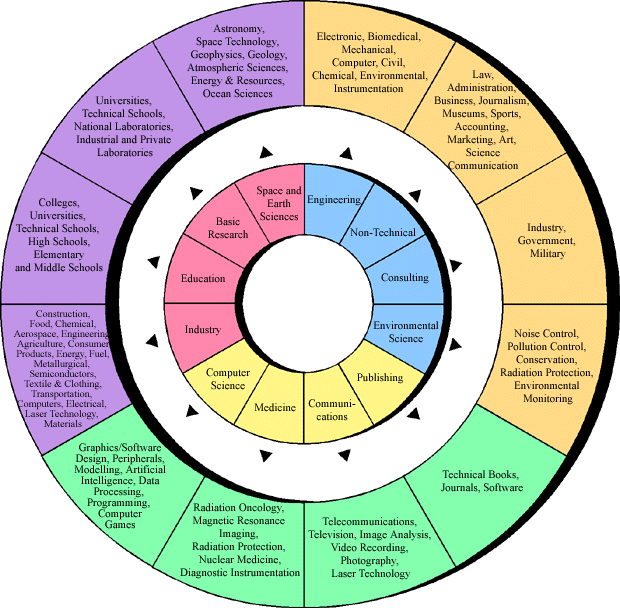Find us on campus

Appleton Hall
This program prepares students for work or graduate studies in physics, astronomy, engineering and other technical fields. Many students combine a degree in physics with studies in math, chemistry or computer science to prepare for interdisciplinary technical fields.
The Physics department offers both Bachelor of Arts and Bachelor of Science degrees. Both majors offer training in the fundamentals of physics, from classical mechanics to quantum mechanics. The B.S. is specifically designed for students interested in staying in the field after graduation while the B.A. is more flexible for preparing for pursuing affiliated fields such as engineering.
We strongly recommend students begin either major with General Physics I (PHYS 231) and Calculus I (MATH 121) as early as possible. Ideally, you should take these two classes in the Fall of your first year, because it takes four years from the beginning of the General Physics sequence to complete the requirements for the Bachelor of Science degree.
Please note that General Physics I is offered during only the Fall semester, so a student would have to wait an entire year for it to be offered again. Also, only one section is offered (MWF 11-12:20 plus a choice of lab times). If this conflicts with your current First Year Seminar, your advisor and the physics department chair, Martín Hoecker-Martinez, can work with you to determine whether changing seminars would be recommended. If the course is full when you register, email the instructor, Martín Hoecker-Martinez. We will do our best to accommodate all qualified students who are interested in the major.
Calculus I is a co-requisite for General Physics I, but if you've placed out of it, we strongly encourage you to enroll in the highest calculus course for which you are qualified (Calculus II and III are required for General Physics II and III.) If you place into Integrated Calculus I (MATH 118) or lower, the soonest you could take General Physics I and II would be next year which would still allow you to complete the Physics BA (or you may take comparable summer courses.) Since the math placement exam evaluates your preparation to take Calculus by testing your algebraic skills, particularly those associated with Algebra II, we strongly encourage you to practice them skills over the summer. There are many good sites that can help you review; for example Kahn Academy and ALEKS.
Suggested first-year courses for students interested in physics:
Fall
First-year seminar
General Physics I (PHYS 231) AND lab (PHYS 231L)
Highest possible Calculus class (at least MATH 121)
General Education
Spring
General Physics II (PHYS 232) AND lab (PHYS 232L)
Highest possible Calculus class (at least MATH 122)
General Education
Additional course of interest
Students are required to have a cumulative GPA of 2.5 in the General Physics (PHYS 231-233) and Calculus (MATH 121,122, and 221) sequences in order to declare a physics major.
In cooperation with Columbia University and Washington at St. Louis, the Physics department also supports engineering combined degree pathway.
Research is an important component of a physics education. While research skills are taught in our courses, many students also get additional experience outside of the classroom. In fact, bachelors of science students are required to do so. Students can work on research projects for credit by taking PHYS 378: Physics Research during the school year or for pay over the summer. In Redlands, the Stauffer Center for Science and Mathematics hosts a summer research program. At national labs and universities across the country, the National Science Foundation (NSF) sponsors Research Experiences for Undergraduates (REU) program and the Department of Energy (DOE) sponsors the Science Undergraduate Laboratory Internships (SULI) program. Some of the labs in the SULI program offer internships during the school year as well as the summer. REU deadlines vary, but the application deadline for all SULI summer programs is typically on the same day in early January. All physics majors complete a senior thesis, which is often based on their research.
A physics bachelor's degree can lead to a wide variety of career paths. The problem-solving skills it hones are valued inside and outside of the sciences.
Approximately half of graduates go on to graduate school in fields like physics, astronomy, engineering, and medicine, while the other half get jobs in fields like software, engineering, education, or management. Students going straight into the job market are typically offered higher starting salaries than students with degrees in many other fields.
The American Institute of Physics has an online Grad School Shopper which allows you to search for programs based on a variety of criteria (specialty, degree, GRE requirements, location, etc.).
The American Institute of Physics' "Who's Hiring Physics Bachelors?" lists employers that have recently hired physics bachelors by state. You can read about some of the surprising careers of physics majors in Sigma Pi Sigma's "Spotlight on Hidden Physicists" (note that Joel Peavy is a Redlands alumni).
Many have gone on in physics and engineering, but a physics degree is far more versatile than that. Our graduates have gone on to places like Lawrence Livermore National Labs, Cisco, US Bank, Duke University, Northrop Grumman, the U.S. Navy, So. Cal. Edison, Charles Schwab, and Goldman Sachs, where they've had titles like research scientist, nuclear engineer, president, technical writer, financial analyst, teacher, chief medical physicist, and professor.


Appleton Hall